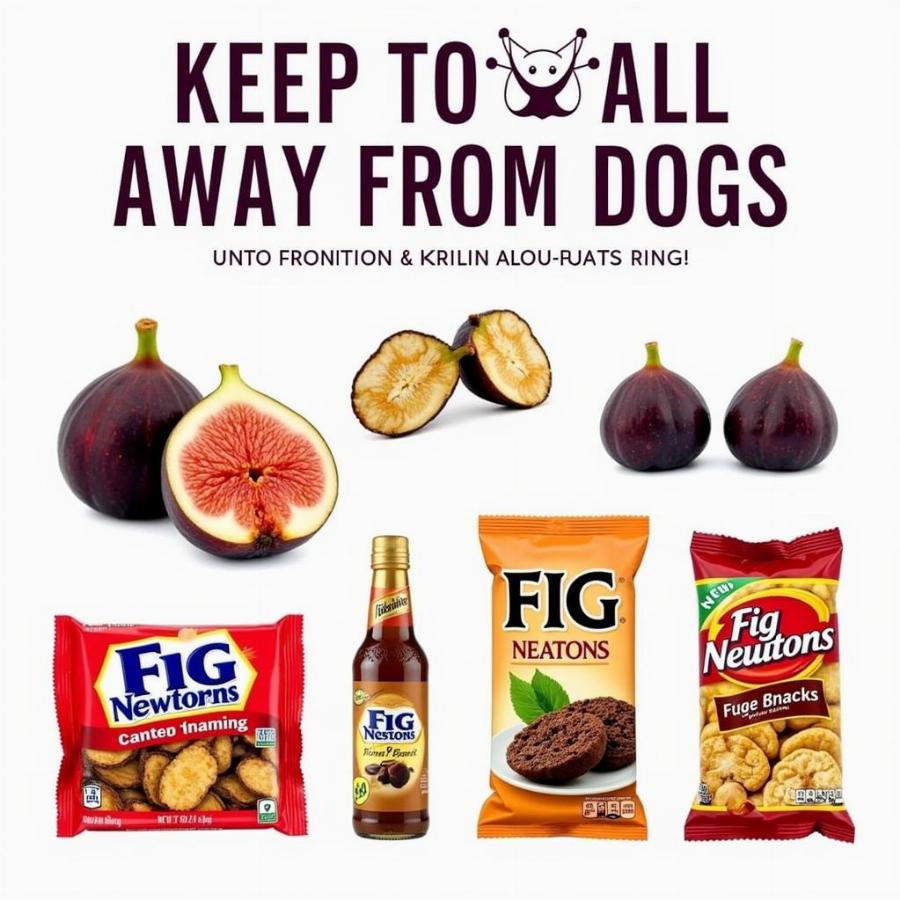Figs are a delicious and healthy treat for humans, but can our furry friends enjoy them too? The short answer is: it’s complicated. While figs aren’t as outright toxic as some other foods, they can still pose potential problems for dogs and should be given with extreme caution. This article will delve into the specifics of fig toxicity in dogs, helping you understand the risks and make informed decisions about your pet’s diet.
Understanding the Potential Dangers of Figs for Dogs
Figs contain a substance called ficin, a proteolytic enzyme. In large quantities, ficin can irritate a dog’s digestive system, leading to vomiting and diarrhea. The sap from the fig tree also contains this enzyme, and direct contact with the sap can cause skin irritation, manifested as redness, itching, and even blisters. While a single fig might not cause severe issues in a larger dog, smaller breeds are more susceptible to ficin’s effects. Furthermore, dried figs contain a higher concentration of ficin than fresh figs, making them even more risky for dogs. So, before you share your fig-based snacks with your pup, think twice!
Can Dogs Have Fig Newtons?
While the figs themselves pose a moderate risk, processed fig products like Fig Newtons introduce another layer of complexity. Fig Newtons and similar treats often contain high levels of sugar, which is unhealthy for dogs and can contribute to weight gain, dental problems, and even more serious conditions like diabetes. Furthermore, some fig-based snacks contain other ingredients, like raisins or nuts, which are highly toxic to dogs. Therefore, it’s best to avoid giving your dog processed fig products altogether. Instead, opt for dog-friendly treats specifically formulated for their nutritional needs.
What to Do If Your Dog Eats a Fig
If your dog manages to snag a fig or a fig-based product, monitor them closely for any signs of distress. Look for symptoms such as vomiting, diarrhea, loss of appetite, excessive drooling, or skin irritation. If you notice any of these symptoms, or if your dog consumes a large quantity of figs, contact your veterinarian immediately. Quick action can prevent potential complications and ensure your furry friend receives the appropriate care.
Preventing Fig Consumption in Dogs
The best way to avoid potential problems is to keep figs and fig products out of your dog’s reach. Store them in secure cabinets or high shelves where your dog can’t access them. Educate your family members, especially children, about the potential risks of figs for dogs. When enjoying figs yourself, be mindful of dropped pieces or discarded stems, and dispose of them properly.
Are Dried Figs More Dangerous Than Fresh Figs?
Yes, dried figs are more dangerous than fresh figs for dogs. The drying process concentrates the ficin, making them more potent and increasing the risk of adverse reactions. Even a small amount of dried figs can cause digestive upset in dogs. Therefore, it’s crucial to keep dried figs away from your furry friend.
 Different fig products that are dangerous for dogs
Different fig products that are dangerous for dogs
Conclusion
While figs are not strictly poisonous to dogs, their potential to cause digestive and skin irritation makes them a less-than-ideal treat. The high sugar content and other potentially harmful ingredients in processed fig products further compound the risks. To keep your canine companion safe and healthy, it’s best to avoid giving them figs altogether. Plenty of other healthy and delicious treats are available that are specifically designed for dogs. Choose those instead, and you’ll ensure your furry friend enjoys a happy and healthy life.
FAQ
-
What is ficin? Ficin is a proteolytic enzyme found in figs that can irritate a dog’s digestive system and skin.
-
What are the symptoms of fig toxicity in dogs? Symptoms include vomiting, diarrhea, loss of appetite, drooling, and skin irritation.
-
Can dogs have Fig Newtons? No, Fig Newtons and similar treats are not recommended for dogs due to their high sugar content and other potentially harmful ingredients.
-
What should I do if my dog eats a fig? Monitor your dog closely for any signs of distress and contact your veterinarian if you notice any symptoms or if your dog consumes a large quantity of figs.
-
How can I prevent my dog from eating figs? Keep figs and fig products out of reach, educate family members about the risks, and dispose of fig remnants properly.
-
Are all parts of the fig plant toxic to dogs? Yes, both the fruit and the sap of the fig plant contain ficin and can be harmful to dogs.
-
What are some safe alternatives to figs for dogs? There are many dog-friendly fruits and vegetables, like apples (without the core and seeds) and carrots, that are safe and healthy treats.
Related Articles You Might Be Interested In:
Beaut Dogs is your go-to source for reliable, helpful, and in-depth information about the world of dog breeds. From understanding breed characteristics and care needs to navigating the legal and financial aspects of dog ownership, Beaut Dogs provides a comprehensive resource for dog lovers. When you need support, contact us at Email: [email protected] to get detailed and accurate answers from Beaut Dogs.